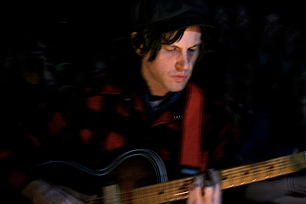
Features | Concerts
Jeff Mangum
By Chris Molnar | 22 November 2011
Jeff Mangum wants to feel closer to his fans than they do. Not that you can blame them; it is a little strange seeing the myth himself after over a decade of silence, a little uncomfortable hearing the erstwhile hermit nagging everybody before a rousing “Ghost” to “fucking sing.” It’s like watching Pynchon do some promos at Barnes & Noble. At one point, when Mangum asked if anybody had a question for him, somebody yelled, “What’s your favorite book?” “You know the answer to that,” he replied, garnering chuckles as he dove straight into “Oh Comely” for maximum effect. Something awesome and terrible about Mangum’s little re-emergence: a pure musician, completely out of “the game,” who’ll never put out an album again if it doesn’t feel right, appeasing us out of the goodness of his heart and nothing else. (Although I’m sure the money isn’t too bad either.)
He sounds flat during the down parts, the segments too hushed for proper sing-along-ing. Maybe it’s not technically different from what he’s like on Live at Jittery Joe’s (2001), but there’s never really been a post-fame Mangum before; he’s never had to sell his hits like he still believes in them. His straight renditions are both more than and never enough, amazing in their mere existence and yet all too humanizing, just some good songs from a guy who hasn’t yet proven he’s written a thing since 1998.
Seeing Mangum perform is really about being with him as he accepts change, as we all accept change, accepting that he wrote some goddamn standards, and that unless he trots them out regularly, they’ll swallow him whole—if they haven’t already. Though we want to see him in the same easy-to-manage distance as always, for him the whole point is to break down those barriers once and for all. The Wall (1979), you know.
Ultimately, seeing him live is experiencing the rawest form of a genius treading water, of someone trying to stay afloat inside an imagination that grew beyond his wildest dreams. With just a handful of words he created infinite rooms for thought, illustrations of his being, the face you can now see again, intense, smiling, unreadable. He has a clarity of metaphor and phrasing that makes even the wonderful Icelandic folk singer Ólöf Arnalds, his eccentric opener, seem slightly unrealized. Even Mangum’s covers, here of Roky Ericson, mostly prove the uncommon durability of his originals. So it’s to his credit that he’s refused to do the Salinger or the Axl Rose, to inflate by omission or build-up. He doesn’t taunt with promises or ideology. He doesn’t shit out product.
We can never repeat the swooning bursts of youth, of our first notions of discovery. We thought he was crazy for not helping us, for just treading water, for not living up to all his genius potential, which should have persisted, forever. But with the benefit of hindsight, we realize he was way ahead of us all along. What he did was probably the best he could have done: he took a long time to think about it, and realized all he wanted, in the most honest, logical way he could, was to be a person again.





